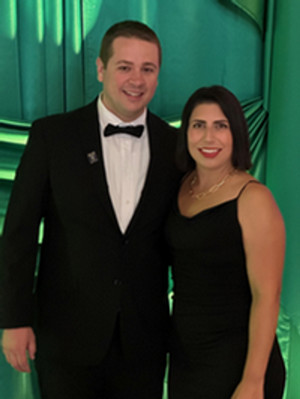A conversation with Mike Zolfo, English alumnus
Mike Zolfo graduated from Catholic University in 2015 with a major in English and a minor in Philosophy and Theology. While at Catholic U, he was a three-year starter on the football team and was captain his senior year. He also completed internships for the City of Chicago’s Office of Federal Affairs and the Department of Justice’s Consumer Protection Branch. Since graduating from Catholic, he obtained a law degree from Chicago-Kent College of Law and practices commercial litigation. He lives in suburban Chicago with his wife and two daughters.

What is your current job/title?
I am a partner in the Litigation Group at Kirkland & Ellis LLP, located in the Chicago office.
Why did you choose to study English at Catholic U.?
While in high school, I had a sense that I would like to eventually study law. I also wanted the opportunity to continue to play football. At Catholic U, I had the opportunity to pursue a classic liberal arts education and have access to everything that DC had to offer, while still playing football. It was a natural fit, and an English degree gave me the chance to develop critical reading and writing skills.

What was your path from graduation to your current job like? What advice can you give senior majors and recent grads about life after graduation?
I decided to go straight from college to law school. But crucially, I was able to use my time at Catholic U to help confirm that was the path I wanted to pursue. I did a political internship the summer going into my junior year, and realized that politics was not something I wanted to pursue as a career. I then interned with the DOJ my junior year second semester, and that confirmed law was a good fit for me. I recommend that everyone use the opportunities and connections that Catholic U provides to start thinking about their post-college career while still at Catholic. Getting exposure to the professional world while still in college is a good way to test out what is a good fit for you.
How has your English background served you professionally?
I read and write every single day. Litigators must be able to read a prodigious volume of cases, briefs, and discovery documents, and then present that information in written form (whether a brief or just a client email) in a way that is easy to comprehend. But even more important is the communication skills you learn from being an English major. Group discussions, interactions with professors and classmates, and more formal presentations help make you more comfortable expressing yourself and communicating a point of view. A lot of litigation is getting in a room with your client, an adversary, or other lawyers, and expressing yourself. Studying English at Catholic U gave me an early start on this skill.
What do you like the most about your job?
 I enjoy the breadth of experience that you get as a litigator. No two cases are the same. Especially at large firm like Kirkland & Ellis, you need to be able to service many different clients in different industries of vastly different backgrounds. This allows you to always be learning, whether it is a new area of law or (more commonly) a new business or client that is something you’ve never worked on before. Cases I have worked on have let me explore everything from how oil wells are drilled to the intricacies of developing Alzheimer’s medication to understanding how a department store should be laid out to attract more customers. That kind of variety is exciting and makes each day different.
I enjoy the breadth of experience that you get as a litigator. No two cases are the same. Especially at large firm like Kirkland & Ellis, you need to be able to service many different clients in different industries of vastly different backgrounds. This allows you to always be learning, whether it is a new area of law or (more commonly) a new business or client that is something you’ve never worked on before. Cases I have worked on have let me explore everything from how oil wells are drilled to the intricacies of developing Alzheimer’s medication to understanding how a department store should be laid out to attract more customers. That kind of variety is exciting and makes each day different.
What does a typical day at work look like for you?
As I noted above, in some ways there is no “typical” day for litigators. The cases can involve ever-changing demands that keep you on your toes, and also a fair bit of travel. But most days do start with dropping my daughter at school, which I always enjoy and gets the day started right.
What did you learn as an English major at Catholic U. that has stayed with you?
I certainly remember some very enjoyable classes taught by Dr. Suarez (Poetry and Rock) and Dr. Johnson (Hemingway and Fitzgerald). My time at Catholic U also taught me to appreciate fiction in a way that I never had before, and I still try to read one or two important works of fiction each year.
Do you have any advice for current English majors?
Try to make the most of every class—oftentimes, the focus is just on the final and mid-terms. But the daily interactions and daily assignments can be just as valuable and important as the end of the year.
